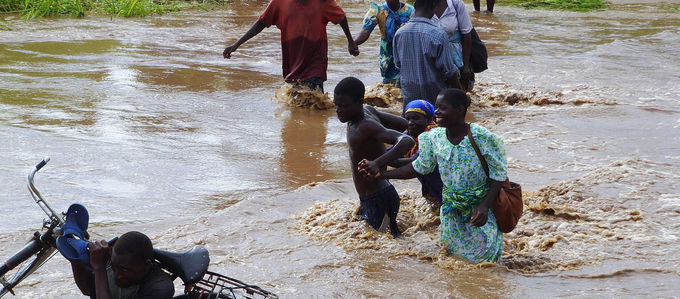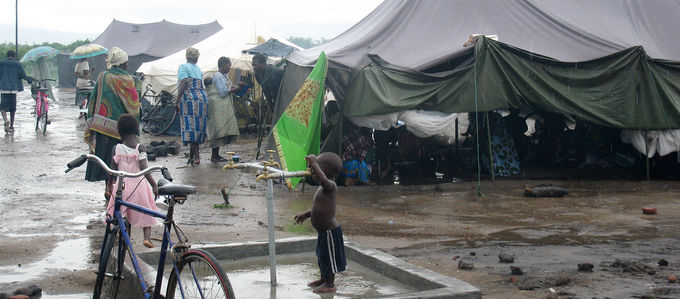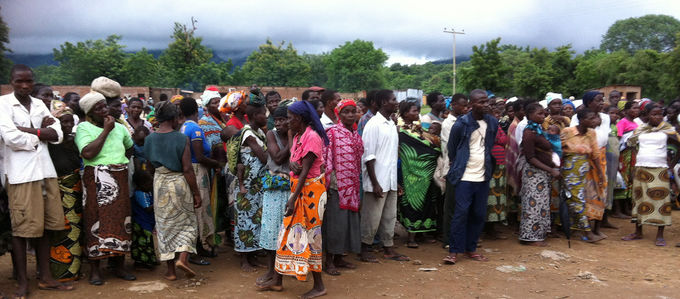
Hardly noticed by the world, thousands of people in southern Malawi are suffering from the consequences of a flood disaster. Hundreds of thousands have not only lost their homes but also their livelihood. In addition to the United Nations (UN), NAK-karitativ and the Henwood Foundation are on the ground and helping.
Heavy downpours since early January have resulted in flash-floods in 15 districts in this Central African country. Entire regions were temporarily cut off from the outside world. Whole villages were swept away by the raging waters. More than 200 people were killed or are reported missing. According to the UN, some 640,000 people in Malawi are affected.
More than 170,000 people are currently living in emergency shelters. The majority have not only lost their homes but also their livelihood: most are farmers and depend on their crops. But some 64,000 hectares of farmland have been submerged. Some fields are under two or three metres of water. And the country is being lashed by rain again.
Ann Soko from the Henwood Foundation, the aid organization of the New Apostolic Church in Zambia, visited four of the emergency shelters. In late January, she was in Malawi to help coordinate the aid projects of nak-karitativ there.
“Several of the emergency camps are already well organized. The problems vary from camp to camp. What is needed most are food supplies, toiletries, tents, and blankets. The most vulnerable, that is children under five years of age, pregnant women, and nursing women desperately need a balanced diet or food supplements to prevent malnutrition,” Ann Soko reports. Apart from these immediate needs, the people in the affected regions urgently need safe water, sanitation, hygiene and shelters, the UN reports.
The cramped conditions and the lack of sanitation facilities are a big worry. “People are sleeping on the hard and bare ground. The situation is dire and is becoming worse,” the coordinator of the Henwood Foundation says. “Diseases and malnutrition will be a problem unless something is done quickly. Some people already have rashes.” There is also a concrete threat of water-related diseases such as diarrhoea and cholera. And a rise in malaria is expected. First examinations have revealed that some 80 per cent of children aged six, have contracted malaria.
The UN and its partner organizations are providing emergency shelters, water purification tablets, blankets, food, and medical care. The Henwood Foundation as well as NAK-karitativ have organized relief supplies: food supplies, tents, clothing, clean water, toiletries, cooking utensils, and blankets.
“More than 100,000 euros have been provided for emergency aid by NAK-karitativ,” Jörg Leske, the chairman explained. He says: “This is only a start. A shipment of medical supplies is being prepared. The lion’s share of aid is yet to come when the flood waters recede and food security programmes can start, which are part of NAK-karitativ’s main commitment in Malawi. It is foreseeable that the damage will be enormous. In addition, there will be transitional assistance and measures to help rebuild destroyed homes and the infrastructure.” Ann Soko is in contact with government officials in order to prepare additional aid projects.
During her visits to the camps, Anne Soko met some of the 1,000 New Apostolic Christians who have been displaced by the floods. But many more members have been affected. Some 30 churches have been destroyed, reports Nimon Muleya of the Church offices in Zambia. But divine services are continuing to be held—if necessary, in the open air.
In any case, there is still a lot that has to be done. The UN estimates that some 81 million US dollars will be needed to respond to essential needs in Malawi. So far, only 21 million dollars have come together.




















